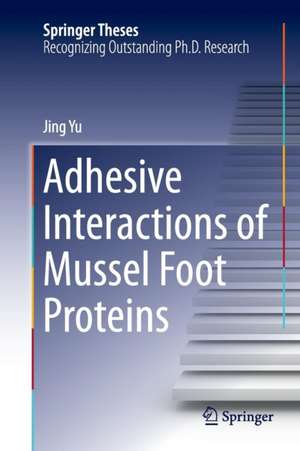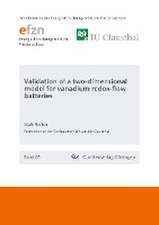Adhesive Interactions of Mussel Foot Proteins: Springer Theses
Autor Jing Yuen Limba Engleză Paperback – 23 aug 2016
| Toate formatele și edițiile | Preț | Express |
|---|---|---|
| Paperback (1) | 630.09 lei 6-8 săpt. | |
| Springer International Publishing – 23 aug 2016 | 630.09 lei 6-8 săpt. | |
| Hardback (1) | 635.96 lei 6-8 săpt. | |
| Springer International Publishing – 26 mai 2014 | 635.96 lei 6-8 săpt. |
Din seria Springer Theses
- 18%
 Preț: 997.88 lei
Preț: 997.88 lei -
 Preț: 389.88 lei
Preț: 389.88 lei - 15%
 Preț: 646.94 lei
Preț: 646.94 lei - 18%
 Preț: 943.43 lei
Preț: 943.43 lei -
 Preț: 399.29 lei
Preț: 399.29 lei - 18%
 Preț: 944.99 lei
Preț: 944.99 lei - 15%
 Preț: 636.80 lei
Preț: 636.80 lei - 18%
 Preț: 941.05 lei
Preț: 941.05 lei - 15%
 Preț: 643.16 lei
Preț: 643.16 lei - 15%
 Preț: 642.68 lei
Preț: 642.68 lei - 18%
 Preț: 1103.62 lei
Preț: 1103.62 lei - 20%
 Preț: 558.83 lei
Preț: 558.83 lei - 18%
 Preț: 1112.30 lei
Preț: 1112.30 lei - 18%
 Preț: 944.19 lei
Preț: 944.19 lei - 18%
 Preț: 1109.92 lei
Preț: 1109.92 lei - 18%
 Preț: 1217.27 lei
Preț: 1217.27 lei - 15%
 Preț: 640.06 lei
Preț: 640.06 lei - 15%
 Preț: 636.45 lei
Preț: 636.45 lei - 15%
 Preț: 640.06 lei
Preț: 640.06 lei - 15%
 Preț: 640.88 lei
Preț: 640.88 lei -
 Preț: 389.70 lei
Preț: 389.70 lei - 20%
 Preț: 563.91 lei
Preț: 563.91 lei -
 Preț: 393.35 lei
Preț: 393.35 lei - 15%
 Preț: 637.93 lei
Preț: 637.93 lei - 15%
 Preț: 641.85 lei
Preț: 641.85 lei - 18%
 Preț: 1225.94 lei
Preț: 1225.94 lei - 20%
 Preț: 551.36 lei
Preț: 551.36 lei - 18%
 Preț: 1229.10 lei
Preț: 1229.10 lei - 15%
 Preț: 639.25 lei
Preț: 639.25 lei - 18%
 Preț: 999.45 lei
Preț: 999.45 lei - 15%
 Preț: 640.06 lei
Preț: 640.06 lei - 18%
 Preț: 1220.45 lei
Preț: 1220.45 lei - 18%
 Preț: 1116.26 lei
Preț: 1116.26 lei - 18%
 Preț: 1110.72 lei
Preț: 1110.72 lei - 18%
 Preț: 1000.87 lei
Preț: 1000.87 lei - 18%
 Preț: 891.17 lei
Preț: 891.17 lei - 15%
 Preț: 640.06 lei
Preț: 640.06 lei - 5%
 Preț: 1154.07 lei
Preț: 1154.07 lei - 15%
 Preț: 635.96 lei
Preț: 635.96 lei - 15%
 Preț: 640.88 lei
Preț: 640.88 lei -
 Preț: 387.20 lei
Preț: 387.20 lei - 18%
 Preț: 1109.92 lei
Preț: 1109.92 lei -
 Preț: 385.25 lei
Preț: 385.25 lei -
 Preț: 385.25 lei
Preț: 385.25 lei - 18%
 Preț: 1112.30 lei
Preț: 1112.30 lei - 18%
 Preț: 999.45 lei
Preț: 999.45 lei -
 Preț: 386.99 lei
Preț: 386.99 lei - 15%
 Preț: 637.13 lei
Preț: 637.13 lei - 20%
 Preț: 554.21 lei
Preț: 554.21 lei - 20%
 Preț: 555.59 lei
Preț: 555.59 lei
Preț: 630.09 lei
Preț vechi: 741.29 lei
-15% Nou
Puncte Express: 945
Preț estimativ în valută:
120.57€ • 128.93$ • 100.53£
120.57€ • 128.93$ • 100.53£
Carte tipărită la comandă
Livrare economică 18 aprilie-02 mai
Preluare comenzi: 021 569.72.76
Specificații
ISBN-13: 9783319383408
ISBN-10: 331938340X
Pagini: 81
Ilustrații: XVI, 65 p. 31 illus., 24 illus. in color.
Dimensiuni: 155 x 235 x 4 mm
Greutate: 0.13 kg
Ediția:Softcover reprint of the original 1st ed. 2014
Editura: Springer International Publishing
Colecția Springer
Seria Springer Theses
Locul publicării:Cham, Switzerland
ISBN-10: 331938340X
Pagini: 81
Ilustrații: XVI, 65 p. 31 illus., 24 illus. in color.
Dimensiuni: 155 x 235 x 4 mm
Greutate: 0.13 kg
Ediția:Softcover reprint of the original 1st ed. 2014
Editura: Springer International Publishing
Colecția Springer
Seria Springer Theses
Locul publicării:Cham, Switzerland
Cuprins
Mussel adhesion.- Surface Interactions in Biological Systems.- Effects of interfacial redox in mussel adhesive protein films on mica.- Antioxidant is a Key Factor in Mussel Protein Adhesion.- Hydrophobic enhancement of Dopa-mediated adhesion in a mussel foot protein.- Learning from the pieces: the adhesion of mussel-inspired peptides.
Notă biografică
Dr. Yu grew up in Hangzhou, a beautiful city in eastern China. He received his B.Sc. in Chemical Engineering from Tsinghua University, China and his PhD in Chemical Engineering from University of California, Santa Barbara. Dr. Yu fell in love with the great sunshine and beach of the University of California, Santa Barbara campus during his 5 years PhD where he worked in Professor Jacob Israelachvili’s group. Yu conducted and pioneered outstanding research in many important areas including the wet adhesion of marine mussel adhesive proteins. Yu’s work has been recognized by multiple international journals and online media sources including Nature, Chemical Biology, ABC Science and the Faculty of 100. Yu is currently a postdoctoral scholar in the Chemistry and Chemical Engineering Division at California Institute of Technology.
Textul de pe ultima copertă
Water and moisture undermine strong adhesion to polar surfaces. Marine mussels, however, achieve durable underwater adhesion using a suite of proteins that are peculiar in having high levels of 3, 4-dihydroxyphenylalanine (Dopa). Mussel adhesion has inspired numerous studies on developing the next generation of wet adhesives. This thesis presents recent progress in understanding the basic surface and intermolecular interactions employed by mussels to achieve strong and durable wet adhesion. The surface forces apparatus (SFA) and various other techniques were applied to measure the interactions between mussel foot protein-3 fast (Mfp-3 fast) and the model substrate, mica, as well as the interactions between various mussel adhesive proteins. The results in this thesis show that Dopa plays an essential role in mussel adhesion, and that mussels delicately control the interfacial redox environment to achieve strong and durable Dopa mediated adhesion. The interplay between Dopa and hydrophobic interactions is also evident in mussel adhesion.
Caracteristici
Nominated as an outstanding thesis by University of California, Santa Barbara Investigate basic surface interactions by mussels Understand surface forces apparatus Investigates adhesion for human medical issues


















